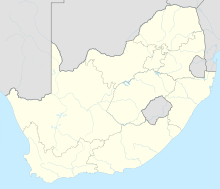Our website is made possible by displaying online advertisements to our visitors.
Please consider supporting us by disabling your ad blocker.
Zungeni Mountain skirmish
| Zungeni Mountain skirmish | |||||||
|---|---|---|---|---|---|---|---|
| Part of the Anglo-Zulu War | |||||||
 Death of Lieutenant Frith, as depicted by Melton Prior in the Illustrated London News of 2 August 1879 | |||||||
| |||||||
| Belligerents | |||||||
|
| Zulu Kingdom | ||||||
| Commanders and leaders | |||||||
|
| Unknown | ||||||
| Strength | |||||||
| 300 warriors | ||||||
| Casualties and losses | |||||||
|
One officer killed At least two men wounded | At least 25 warriors killed | ||||||
Approximate location in present-day South Africa | |||||||
The Zungeni Mountain skirmish (referred to in some contemporary British accounts as the affair at Erzungayan)[2]) took place on 5 June 1879 between British and Zulu forces during the Second invasion of Zululand in what is now part of South Africa. British irregular horse commanded by Colonel Redvers Buller discovered a force of 300 Zulu levies at a settlement near the Zungeni Mountain. The horsemen charged and scattered the Zulu before burning the settlement. Buller's men withdrew after coming under fire from the Zulu who had threatened to surround them.
A force of British cavalry commanded by Major-General Frederick Marshall arrived on the scene and were eager to see action. A squadron of the 17th (The Duke of Cambridge's Own) Lancers, led by Colonel Drury Drury-Lowe, charged the Zulu. They cleared the open ground but were not able to press into an area of long grass and bushes from which the Zulu were firing upon the British. The lancers withdrew after their regimental adjutant, Lieutenant Frederick John Cokayne Frith, was killed by a sniper and the Zulu threatened to outflank them. The British then withdrew to their camp of the previous night. Aside from Frith the British casualties included two irregulars wounded; two months after the battle the remains of 25 Zulu were discovered on the battlefield. After the skirmish the British paused to fortify their camp before proceeding further into Zululand, decisively defeating the Zulu in the 4 July Battle of Ulundi.
- ^ Smith 2014, p. 194.
- ^ Annual Army List (PDF). London: John Murray. 1883. p. 138.
Previous Page Next Page



